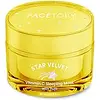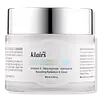What's inside
What's inside
 Key Ingredients
Key Ingredients

 Benefits
Benefits

 Concerns
Concerns

 Ingredients Side-by-side
Ingredients Side-by-side

Water
Skin ConditioningCetearyl Alcohol
EmollientGlycerin
HumectantButylene Glycol
HumectantGlyceryl Stearate
EmollientCetyl Ethylhexanoate
EmollientButyrospermum Parkii Butter
Skin ConditioningPolyglyceryl-3 Methylglucose Distearate
EmulsifyingSimmondsia Chinensis Seed Oil
EmollientDimethicone
EmollientSorbitan Sesquioleate
Emulsifying1,2-Hexanediol
Skin ConditioningSodium Hyaluronate
HumectantHippophae Rhamnoides Fruit Extract
Skin ConditioningBetaine
HumectantHelianthus Annuus Seed Oil
EmollientBeta-Carotene
Skin ConditioningCarbomer
Emulsion StabilisingArginine
MaskingPropanediol
SolventCaprylyl Glycol
EmollientIllicium Verum Fruit Extract
PerfumingXanthan Gum
EmulsifyingPanthenol
Skin ConditioningBeta-Glucan
Skin ConditioningTocopheryl Acetate
AntioxidantCitrus Junos Fruit Extract
Skin ConditioningEthylhexylglycerin
Skin ConditioningCeramide NP
Skin ConditioningGlycosphingolipids
EmollientHydrogenated Lecithin
EmulsifyingSalvia Officinalis Leaf Extract
CleansingChamaecyparis Obtusa Leaf Extract
Skin ConditioningMelissa Officinalis Leaf Extract
Skin ConditioningPinus Densiflora Leaf Extract
AntimicrobialNelumbo Nucifera Leaf Extract
Skin ConditioningAvena Sativa Meal Extract
SoothingOryza Sativa Bran Extract
Skin ConditioningSolanum Lycopersicum Fruit Extract
AntioxidantAscorbic Acid
Antioxidant3-O-Ethyl Ascorbic Acid
Skin ConditioningCitrus Aurantium Dulcis Peel Oil
MaskingWater, Cetearyl Alcohol, Glycerin, Butylene Glycol, Glyceryl Stearate, Cetyl Ethylhexanoate, Butyrospermum Parkii Butter, Polyglyceryl-3 Methylglucose Distearate, Simmondsia Chinensis Seed Oil, Dimethicone, Sorbitan Sesquioleate, 1,2-Hexanediol, Sodium Hyaluronate, Hippophae Rhamnoides Fruit Extract, Betaine, Helianthus Annuus Seed Oil, Beta-Carotene, Carbomer, Arginine, Propanediol, Caprylyl Glycol, Illicium Verum Fruit Extract, Xanthan Gum, Panthenol, Beta-Glucan, Tocopheryl Acetate, Citrus Junos Fruit Extract, Ethylhexylglycerin, Ceramide NP, Glycosphingolipids, Hydrogenated Lecithin, Salvia Officinalis Leaf Extract, Chamaecyparis Obtusa Leaf Extract, Melissa Officinalis Leaf Extract, Pinus Densiflora Leaf Extract, Nelumbo Nucifera Leaf Extract, Avena Sativa Meal Extract, Oryza Sativa Bran Extract, Solanum Lycopersicum Fruit Extract, Ascorbic Acid, 3-O-Ethyl Ascorbic Acid, Citrus Aurantium Dulcis Peel Oil
Water
Skin ConditioningGlycerin
HumectantButylene Glycol
HumectantTocopheryl Acetate
AntioxidantNiacinamide
SmoothingSodium Hyaluronate
HumectantCarrageenan
Gellan Gum
Betaine
HumectantAlgin
MaskingMannan
Ceramide NP
Skin ConditioningPEG-60 Hydrogenated Castor Oil
EmulsifyingAcrylates/C10-30 Alkyl Acrylate Crosspolymer
Emulsion StabilisingChlorphenesin
AntimicrobialArginine
MaskingEthylhexylglycerin
Skin ConditioningCentella Asiatica Extract
CleansingRubus Fruticosus Fruit Extract
AstringentSalicornia Herbacea Extract
Skin ConditioningPhragmites Communis Extract
Skin ConditioningAdenosine
Skin ConditioningLavandula Angustifolia Oil
MaskingEucalyptus Globulus Leaf Oil
PerfumingPelargonium Graveolens Flower Oil
MaskingCitrus Limon Peel Oil
MaskingCitrus Aurantium Dulcis Peel Oil
MaskingCananga Odorata Flower Oil
MaskingWater, Glycerin, Butylene Glycol, Tocopheryl Acetate, Niacinamide, Sodium Hyaluronate, Carrageenan, Gellan Gum, Betaine, Algin, Mannan, Ceramide NP, PEG-60 Hydrogenated Castor Oil, Acrylates/C10-30 Alkyl Acrylate Crosspolymer, Chlorphenesin, Arginine, Ethylhexylglycerin, Centella Asiatica Extract, Rubus Fruticosus Fruit Extract, Salicornia Herbacea Extract, Phragmites Communis Extract, Adenosine, Lavandula Angustifolia Oil, Eucalyptus Globulus Leaf Oil, Pelargonium Graveolens Flower Oil, Citrus Limon Peel Oil, Citrus Aurantium Dulcis Peel Oil, Cananga Odorata Flower Oil
 Reviews
Reviews

Ingredients Explained
These ingredients are found in both products.
Ingredients higher up in an ingredient list are typically present in a larger amount.
Arginine is an amino acid that is important for human development. Your body uses is it to produce hair keratin and skin collagen.
As a cosmetic ingredient, Arginine has antioxidant properties and can also help repair damaged skin. This ingredient is derived either synthetically or from animals.
Arginine isn't fungal acne safe when used in the presence of other lipids (fats, fatty acids, oils, esters, etc). Oils and fats occur naturally within the skin, so take caution when using Arginine if you're prone to fungal acne.
Learn more about ArginineBetaine is a common humectant (a substance that promotes retention of moisture). It's known to be gentle on the skin and can help balance hydration.
This ingredient is best for improving hydration and soothing irritated skin. Studies also show it helps even out skin tone.
Fun fact: Betaine is naturally created in the skin and body. The kind found within cosmetic products can be either plant-derived or synthetic.
Another name for betaine is trimethylglycine.
Learn more about BetaineButylene Glycol (or BG) is used within cosmetic products for a few different reasons:
Overall, Butylene Glycol is a safe and well-rounded ingredient that works well with other ingredients.
Though this ingredient works well with most skin types, some people with sensitive skin may experience a reaction such as allergic rashes, closed comedones, or itchiness.
Learn more about Butylene GlycolCeramide NP is a type of ceramide and formally known as ceramide 3.
Ceramides are intercellular lipids naturally found in our skin that bonds dead skin cells together to create a barrier. They are known for their ability to hold water and thus are a great ingredient for dry skin.
Ceramides are an important building block for our skin barrier. A stronger barrier helps the skin look more firm and hydrated. By bolstering the skin ceramides act as a barrier against irritating ingredients. This can help with inflammation as well.
If you would like to eat ceramides, sweet potatoes contain a small amount.
Read more about other common types of ceramides here:
Ceramide AP
Ceramide EOP
Citrus Aurantium Dulcis Peel Oil is oil from the peel of an orange fruit.
Limonene and linalool make up the majority of oils from citrus peels. Limonene has a "citrus" fragrance. Citrus peels also contain flavonoids, which have anti-inflammatory properties.
Citrus peel is also a rich source of flavonoids. Flavonoids are natural antioxidants and help protect your skin against damage. Flavonoids are a group of compounds naturally found in vegetables and fruits.
The term 'fragrance' is not regulated in many countries. In many cases, it is up to the brand to define this term. For instance, many brands choose to label themselves as "fragrance-free" because they are not using synthetic fragrances. However, their products may still contain ingredients such as essential oils that are considered a fragrance.
Learn more about Citrus Aurantium Dulcis Peel OilEthylhexylglycerin (we can't pronounce this either) is commonly used as a preservative and skin softener. It is derived from glyceryl.
You might see Ethylhexylglycerin often paired with other preservatives such as phenoxyethanol. Ethylhexylglycerin has been found to increase the effectiveness of these other preservatives.
Glycerin is already naturally found in your skin. It helps moisturize and protect your skin.
A study from 2016 found glycerin to be more effective as a humectant than AHAs and hyaluronic acid.
As a humectant, it helps the skin stay hydrated by pulling moisture to your skin. The low molecular weight of glycerin allows it to pull moisture into the deeper layers of your skin.
Hydrated skin improves your skin barrier; Your skin barrier helps protect against irritants and bacteria.
Glycerin has also been found to have antimicrobial and antiviral properties. Due to these properties, glycerin is often used in wound and burn treatments.
In cosmetics, glycerin is usually derived from plants such as soybean or palm. However, it can also be sourced from animals, such as tallow or animal fat.
This ingredient is organic, colorless, odorless, and non-toxic.
Glycerin is the name for this ingredient in American English. British English uses Glycerol/Glycerine.
Learn more about GlycerinSodium Hyaluronate is hyaluronic acid's salt form. It is commonly derived from the sodium salt of hyaluronic acid.
Like hyaluronic acid, it is great at holding water and acts as a humectant. This makes it a great skin hydrating ingredient.
Sodium Hyaluronate is naturally occurring in our bodies and is mostly found in eye fluid and joints.
These are some other common types of Hyaluronic Acid:
Learn more about Sodium HyaluronateTocopheryl Acetate is AKA Vitamin E. It is an antioxidant and protects your skin from free radicals. Free radicals damage the skin by breaking down collagen.
One study found using Tocopheryl Acetate with Vitamin C decreased the number of sunburned cells.
Tocopheryl Acetate is commonly found in both skincare and dietary supplements.
Learn more about Tocopheryl AcetateWater. It's the most common cosmetic ingredient of all. You'll usually see it at the top of ingredient lists, meaning that it makes up the largest part of the product.
So why is it so popular? Water most often acts as a solvent - this means that it helps dissolve other ingredients into the formulation.
You'll also recognize water as that liquid we all need to stay alive. If you see this, drink a glass of water. Stay hydrated!
Learn more about Water